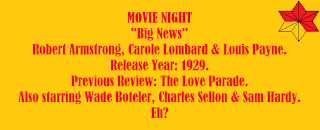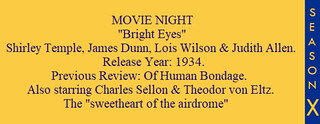Cast:
Robert Armstrong (Steve Banks), Carole Lombard (Margaret Banks), Louis Payne (Hensel), Wade Boteler (O'Neill), Charles Sellon (Addison), Sam Hardy (Reno), Tom Kennedy (Ryan), Warner Richmond (District Attorney Phelps), and Helen Ainsworth (Vera, society editor) Directed by Gregory La Cava (#1787 - My Man Godfrey)
Review:
Remember the good ol' days of directors being tasked to make movies on the quick and low that had a semblance of a plot to go with sound? Well, okay, maybe you are quite familiar with films of the late 1920s that saw plenty of filmmakers try to mold themselves away from the silent era with new output of sound and all the challenges that came with doing so. Gregory La Cava was at least familiar with making a number of films with romantic or comedic interludes before this one, cultivating himself with two-reel comedies before moving into features in the 1920s. and this one that was spearheaded by Pathé Exchange, Inc (the American subsidiary of Pathe-turned independent spinoff that did a number of movies from the 1910s until 1930). The film was based on the play For Two Cents by George S. Brooks, while the adaptation was done by Walter DeLeon, Jack Jungmeyer and Frank Reicher. Strangely enough, the film has a sound gimmick within its plot, because the climax involves a Dictaphone record. Well, that, and a reporter who has to fight alcoholism and a crime ring that wants to frame him for murder...of the boss that just fired him (yea, okay). The film features Carole Lombard, billed as Carol Lombard for the second-to-last time in her career, with this being one of three sound films in 1929. Of course, the real fresh face is Robert Armstrong, who actually had studied law at the University of Washington before becoming an actor while nearing the age of thirty in 1919 and a film actor in 1927.
Somehow, this just didn't become one of those sound movies that people really remember. Maybe it was just too low budget to really dazzle audiences curious for hearing people talk, or maybe it just was something else (for curiosity, I looked up any contemporary review I could see of this film, and the only one called it a movie that "will make money wherever it is shown" - this was released only a month before the Wall Street crash, incidentally). When it comes to newspaper wisecrackers, The Front Page (released two years later as an adaptation of a Broadway play) probably ends up being one of the first ones you would mention among the early sound features, mostly because of its own snappy dialogue and eclectic timing. Of course, both movies were made before the rigid enforcement of the Production Code, so there's that to consider. Big News is merely just a thing that exists in mediocrity, not exactly writing the wheel on camera movement or snappy newspeak, but it can work out for those who want to spend 75 minutes on something that moves in a straight line. Sure, there are a few moments where it explores the trouble of trying to let go a good bottle, but you probably know where it will go in setting the steps to inevitably laying off the stuff (because hey, this was the 1920s), for better or worse. Armstrong in that sense makes a quality lead to follow, one who can play things with wryness that doesn't aim for straight pity, earning stripes of charm gradually over time for general interest. The newspaper scenes are breezy and worthy in what you might see from banter that doesn't plod too much, and Lombard shows withering devotion that has the bare promise of having screen presence with better material. Hardy plays the heavy with relatively no trouble, while Kennedy and Ainsworth make goofy support. As a whole, the movie looks exactly what you'd see from something with two sets and a climax that is not nearly as built together as it thinks it is (with a haphazard setup that is solved haphazardly) in a confusing muddle of a movie. Watching the movie seems like watching rainwater slowly move down gutters - it might seem nice for a while, but you won't really remember much of it when it passes by. It just doesn't do enough to win out in the end, but at least the main folks got to do more promising things.
Overall, I give it 6 out of 10 stars.



